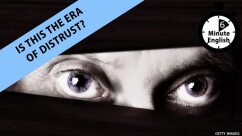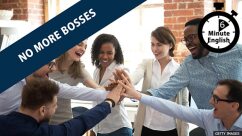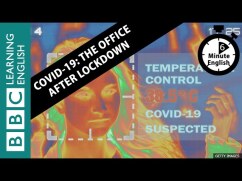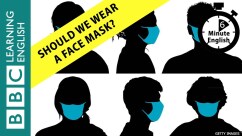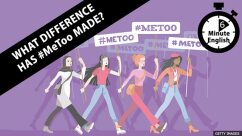Getting Dressed & Ready for Work.pdf
Getting Dressed & Ready for Work.mp3
COMPLETE TRANSCRIPT
Welcome to English as a Second Language Podcast number 5: Getting Dress
and Ready for Work
This is English as a Second Language Podcast episode number five. I’m your
host, Dr. Jeff McQuillan, coming to you from the Center for Educational
Development in beautiful Los Angeles, California.
In this episode, I’ll talk about getting dressed and ready for work.
Let’s get started!
[Start of story]
I go back into my bedroom and open up closet door. I have about 30 dress
shirts, 10 pairs of pants, a half-dozen ties, and some sweaters, suit jackets, and
t-shirts. I pull out a clean pair of socks and underwear, and then decide which
shirt I’m going to wear today. I’m terrible at color coordinating, so I usually bring
my wife in at this point to help match my shirt and pants. I put on my belt with the
silver buckle and polish my shoes. I put my cell phone and car keys in my front
pocket, and my wallet in the back one.
I put on my glasses and check myself in the mirror to make sure I look okay, and
then go into the home office to get my bag. I used to carry a more traditional
briefcase, but now I just use my computer bag to hold my laptop and my papers.
Now it’s back into the kitchen to grab my Thermos on the way out the door. I
lock the door and then hurry to my car in the garage. I’m usually running late and
today is no exception!
[End of story]
Part four is called “Getting Dressed and Ready for Work.” We began by me
going into the bedroom and opening up my closet door. “To open up” means
here to open the door. A “closet” (closet) is a place, usually in your bedroom,
where you put clothes—you store your clothing. You can also have a closet in
other parts of your house, and it's usually a place where you keep things—you
store things.
Well, I “open up my closet door” and I look at my dress shirts. My “dress (dress)
shirts” – two words. are the nice shirts, the shirts that I can wear to work. The
opposite of a dress shirt would be a “casual shirt” (casual). A dress shirt is a nice
shirt; something that usually has a collar on it. A “collar” (collar) is the top of the
shirt, what goes around the neck.
Well, I look at my dress shirts and I look, also, at my “pants” (pants). Pants are
what you put on your legs. You can have different kinds of pants. Jeans is a
type of pants. We might say dress pants for nice pants that you would wear to
work. I also have “ties”. A “tie” (tie) is a long, thin thing that goes around your
neck that men usually wear—often wear to work, and it comes in different colors,
and that's your tie.
A “sweater” (sweater) is something that keeps you warm. It's like a shirt that's
very thick. You usually put a sweater over your shirt so that you can be warm.
“Suit jackets” (suit jackets) – two words – are jackets that you wear that are for a
formal occasion. So, if you are going to work, especially if you were going to an
interview, you would wear a suit jacket. The word “suit” (suit) refers to a formal
set of clothing for, in this case, a man. For a man it would be pants and a,
probably, white shirt and a suit jacket that goes over your shirt. Usually, you
would also have a tie that you wear. That's a suit. Well, a suit jacket is part of a
suit.
A “t-shirt,” spelled (t-shirt)is a plain shirt that you usually wear underneath a dress
shirt. So first, you put on a t-shirt—a white t-shirt—then you would put on your
shirt, and then you would put on you jacket. T-shirts can also be used by
themselves as your main shirt. It is usually an informal occasion that you would
just wear a t-shirt. You probably wouldn't wear a t-shirt to your office, for
example, though some people do. And, many people have t-shirts that have
things on them—that say things on them. T-shirts usually do not have a collar
like a dress shirt does.
“I pull out a pair of socks and underwear.” “Socks” (socks) are the things you put
on your feet before you put your shoe on. Socks can be dark, or they can be
light or white socks. Normally you don't wear white socks with a formal suit; you
would wear black or dark blue socks.
“Underwear” is the piece of clothing that you put on and it covers up all of the—
how should we say—things that you want to cover so that you can keep your
pants and shirt clean. Underwear is something that goes over your back of your
body, your butt or your rear, as well as the front of the body, whatever you have
there. Underwear can come for men in two basics styles usually. There can be
boxer underwear, or “boxer” shorts (boxer) and that's a kind of short—or rather, a
kind of underwear that it is loose on the bottom. So, it's almost like a pair of
shorts. The opposite of that would be “briefs” (briefs). Briefs would be
underwear that is not loose at the bottom; it's tight at the bottom of the
underwear. Usually it's a little smaller as well.
I “then decide which shirt I'm going to wear today. “I'm terrible,” I say, “at color
coordinating.” “Color coordinating” means you wear things that have similar or
matching colors. So, if you wore a pink shirt you would probably not wear green
pants because they don't do together, we would say; they don't look very good
with each other. Color coordinating is finding the right colors that you wear on
your—with your shirt, and your pants, and your tie, and your jacket, and your
socks, and your shoes. All of those have to be color coordinated. The verb “to
coordinate,” (coordinate) means to put two things together so that they work well
together, in this case.
Well, since I'm so terrible—I'm so bad—at color coordinating I usually bring in my
wife, that is I go and ask my wife to come into the room. So, I “bring my wife
in”—to the room— “at this point to help me,” meaning at this time, when I've
already picked out some things, then I bring my wife to help me “match my shirt
and pants.” I want them color coordinate.
“I put on my belt with the silver buckle and polish my shoes.” A “belt” (belt) is
what you use to keep your pants from falling down. A buckle is the piece of,
usually, metal in the front that connects the belt so it forms a circle around your
body. I have a silver buckle that I put on with my belt.
I also “polish my shoes.” “To polish” (polish) means to clean and to make “shiny”
(shiny). When we say something is shiny, we mean that it's bright—it reflects
light. So, when you polish your shoes, you want them to be clean but you also
want them to look like they are bright—they are reflecting light. I polish my shoes
and my head, so it's very shiny!
“I put my cell phone,” my cellular or mobile phone, “and car keys in my front
pocket.” You have front pockets and you have back pockets in a pair of pants.
So, I put my keys and cell phone in the front pocket “and my wallet in the back”
pocket. My “wallet” (wallet) is where I put my money and my credit cards and my
driver's license; all of those things go in my wallet.
“I put on my glasses,” because I cannot see without my glasses very well, and I
“check myself in the mirror.” “To check yourself” means to look at yourself,
usually in a mirror, and you can see how you look. I usually look pretty ugly. I
check myself in the mirror, and then I go into my “home office,” or my office in my
house and get my bag. I used to carry a more traditional briefcase.” A
“briefcase” (briefcase) – all one word – is not something that you put your
underwear in—your briefs. A briefcase means the thing that you carry papers in
when you are going from your home to your office. Usually a briefcase is square
and it usually has hard sides on it, many times it has a lock on the top; that's a
briefcase. A lot of people nowadays do not use a briefcase; they use a computer
bag—a bag that they can put their computer and other information in, including
their papers.
Well, I put my things into my computer bag, then I go “back into the kitchen to
grab my Thermos,” to get or take my Thermos with my coffee in it “on the way
out the door.” The expression, “on the way out,” means that you are about to
leave or you are leaving your house, in this case. Somebody may call you on the
phone and you are getting ready to go to dinner, you could say, “I can't talk right
now, I'm on my way out the door,” means I'm just getting ready to leave.
Well, before I leave—before I'm going out the door—I “grab my Thermos. I lock
the door,” to my house, “and then I hurry to my car in the garage.” The “garage”
(garage) is the place where you keep your car.
“I'm usually running late and today is no exception!” When you are running late,
you are behind your schedule; you're behind time that you want to be
somewhere. “To run late” means the same as to be late or to be tardy (tardy).
Usually that word, “tardy,” is only used in school. We say a student is tardy, we
mean that they are late for school or late for class. To be running late means
that you are not on the schedule that you want to be on—that you did not leave
at the time you wanted to leave.
I say “I'm running late and today is no exception!” That expression, “is no
exception” (exception) means that today is the same as every other day—it is not
different. An exception is when something is different. Well, today is no
different, that means today is no exception—it is not different.
Now let's listen to the story, this time at a normal speed.
[Start of story]
I go back into my bedroom and open up my closet door. I have about 30 dress
shirts, 10 pairs of pants, a half-dozen ties, and some sweaters, suit jackets, and
t-shirts. I pull out a clean pair of socks and underwear, then decide which shirt
I’m going to wear today. I’m terrible at color coordinating, so I usually bring my
wife in at this point to help match my shirt and pants. I put on my belt with the
silver buckle and polish my shoes. I put my cell phone and car keys in my front
pocket, and my wallet in the back one.
I put on my glasses and check myself in the mirror to make sure I look okay, and
then go into the home office to get my bag. I used to carry a more traditional
briefcase, but now I just use my computer bag to hold my laptop and my papers.
Now it’s back into the kitchen to grab my Thermos on the way out the door. I
lock the door and then hurry to my car in the garage. I’m usually running late and
today is no exception!
[End of story]
Her scripts are always great, and this one is no exception. I speak of our
wonderful scriptwriter, Dr. Lucy Tse.
From Los Angeles, California, I’m Jeff McQuillan, thank you for listening. Come
back and listen to us again right here on ESL Podcast.
GLOSSARY
closet – a very small room or a piece of furniture for storing clothes and shoes
Kevin needs to stop buying so many clothes. He can’t even close his closet*
doors!
dress shirt – a man’s shirt worn for office work, with a collar, buttons, and long
sleeves
Do you think it’s okay for a man to wear a pink dress shirt to work?*
pants – clothing worn over the legs
Jennifer couldn’t decide whether she wanted to wear pants or a skirt, so she*
chose a dress instead.
tie – a long, narrow piece of fabric worn around a man’s neck
He doesn’t like wearing ties because he says they make it hard for him to*
breathe.
sweater – a heavy, knitted shirt made of cotton or wool yarn (material that looks
like a thick string)
It’s very cold outside, so you and your sister should put on your sweaters if you*
want to play at the park.
suit jacket – a piece of formal clothing worn over a shirt, with long sleeves and
buttons on the front, usually worn in formal business settings
The sleeves of his suit jacket are too short. He needs to buy a new one for his*
interview.
t-shirt – a comfortable, casual, short-sleeved cotton shirt with no collar, often
with a design or picture on the front
You don’t have to dress up to come to my party. I plan to just wear a t-shirt and
jeans.
socks – clothing worn on one’s feet * In the winter, I wear socks and shoes, but in the summer, I prefer to wear*
sandals without socks.
underwear – clothing worn next to the skin and under other clothing
We have to do laundry today because I don’t have any clean underwear!
to color coordinate – to identify things that look good together because they
have the same or colors that look good together
* Her bedroom walls, floors, pictures, and toys are all color coordinated. I have*
never seen so much green in one room!
buckle – a piece of metal used to connect two ends of a belt, shoe, or bag
American cowboys often wore large belt buckles with images of their daily life*
to polish – to rub something to make it shine
Before going to the wedding, I need to polish my black shoes so they’ll look*
nice with my suit.
wallet – a piece of leather or heavy fabric with many pockets that is used to store
money and credit cards
He needed to clean out his wallet because it was too full of business cards and*
receipts to fit in his pocket.
to check (oneself) – to look at oneself, searching for something that looks wrong
or is out of place
I wish I had checked myself in the mirror before the big meeting because I had*
food between my teeth.
briefcase – a flat bag with a handle to carry documents, usually used by office
workers to carry papers between their home and the office
She forgot her briefcase at home and had to ask her husband to bring it to her*
at the office so she’d have her notes for the presentation.
garage – a room in a house for parking cars
They have so many things in their garage that they almost don’t have room to*
park their car!
to run late – to be delayed; to be behind schedule; to be in a hurry because one
needs to be somewhere very soon
I didn’t have time to say goodbye to everyone at the lunch meeting because I*
was running late for my flight back to New York.
today is no exception – today is the same; today is not different
I usually receive a lot of emails and today is no exception. This morning I had*
238 messages in my inbox!

